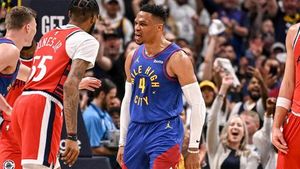At this year's Paris 2024 Olympics, the intersection of athletic prowess and popular culture has reached new heights—most noticeably through the vibrant presence of anime. With the global spotlight on this prestigious sporting event, anime has not only become a cultural touchstone but has also blurred the lines between traditional sports fandom and nerd culture.
This phenomenon didn't come out of nowhere; it actually has deep roots in the evolving perceptions of anime over the years. No longer just viewed as niche or geeky, anime is manifesting itself firmly in mainstream culture, and the Olympics is the perfect stage for its big debut. From July 26 to August 11, as athletes give their all, we see them channeling their favorite anime characters, turning moments of competitive glory and celebration directly to their inspirations.
Take, for example, the U.S. track star Noah Lyles, who made waves with his charismatic antics during the Games. Shortly before he soared to gold in the 100-meter sprint, he waved around “Yu-Gi-Oh!” cards, embracing the spirit of fun and fandom. His post-win moment was equally unforgettable as he struck the powerful “Kamehameha” pose, instantly referencing the beloved world-renowned Dragon Ball series. Such moments were not isolated; they echoed through the Olympic venue, where athletes from around the globe embraced anime references, expressing their sporting victories with the same fervor and flair one might see at a fan convention.
The Uzbekistan rhythmic gymnastics team also took to the stage with their charming Sailor Moon-inspired performance, demonstrating how deeply anime has rooted itself even among traditional athletic showcases. The sports arena is now not just home to displays of sheer physicality but also to the joy and whimsy found within anime, fortifying its hold on culture.
Cultural analyst Tatiana Tacca offered insight by noting, “Even in professional sports, Jamaal Williams, Zion Williamson, and Joel Embiid are actively leaning in on nerd culture and anime. Athletes have always been attracted to nerd culture, but maybe there just hasn’t been as much spotlight on it until recently.” This statement reflects the generational shift whereby younger groups, particularly Generation Z and Alpha, who grew up with anime's vibrant storytelling, are now influencing the cultural zeitgeist on platforms like social media.
The excitement was palpable during the 2020 Tokyo Olympics, which was already weaving anime references through its ceremonies and athlete expressions. A Japanese host donned the mask and attire of Naruto, signaling the beginning of this trend toward the public's acceptance. Fast forward to Paris, and the anime references have increased significantly, lending to the idea championed by journalist Kerry Waananen, who described how both athletes and fans enjoy the playful engagement with these cultural icons on social media. “It’s safe to say anime is now one-upping what it had during the Tokyo Olympics,” Waananen explained, alluding to this cultural progression.
At the core of this soaring interest lies the average age of Olympic athletes, which hovers around 26.5 years. Young athletes who grew up immersed in anime are now inhabiting the world stage, actively incorporating elements from their fandoms. This newfound embrace of anime mirrors the broader cultural acceptance as traits previously seen as 'nerdy' quickly become part of the mainstream identity.
Yasu Sasaki, global chief creative officer of Dentsu, elaborated on this shift by stating, “The 90s animation revival and blockbuster hits certainly play a part. The generation enjoying movies like The Lion King and Toy Story are today’s brand decision-makers. They instinctively ‘get’ anime and the devotion of its fandom.” This connection serves not only to connect athletes with fans but also as marketers and advertisers take note—anime has arrived, and 2024's Paris Olympics is just the latest showcase of its undeniable relevance.
Marketers are likely to pay close attention to how athletes are drawing parallels between their human abilities and the almost supernatural characteristics of anime characters. The remarkable feats witnessed at the Olympics often find themselves measured against the intense physical abilities portrayed within anime, creating this fantastical blend of reality and artistic expression. Tatiana Tacca noted, “When we see these athletes achieve extraordinary things, it resonates with the anime we’ve grown up with, making those comparisons unavoidable.”
No one can overlook how the Paris Olympics will also feature notable performances during the closing ceremony on August 11, 2024. Pop culture icons like Billie Eilish and Snoop Dogg are set to deliver unforgettable musical moments, contributing to the energy of the event. According to reports, they will be part of the celebratory handoff to Los Angeles for the next summer Games happening in 2028.
Billie Eilish's anticipated performance adds significant excitement to the ceremony, alongside the classic rock legends, the Red Hot Chili Peppers, who just might bring the nostalgia for many attendees. Each act symbolizes the integration of modern pop culture with the long-standing traditions of the Olympic Games, creating an atmosphere rich with excitement and celebrity.
Rumors suggest other mega-stars like Taylor Swift and Tom Cruise might also surprise fans at the closing ceremony. The anticipation surrounding their potential involvement could push the event's star power through the roof as attendees stay glued to performances honoring not only sports achievements but also major cultural touchstones.
While the Gold, Silver, and Bronze medals capture the skill of the athletes, the Olympic Games this year are also captivated by other achievements, worth mentioning are the unique performances and the support from fans and early celebrations as Australia celebrates climbing the medal tally with 18 gold medals, 12 silver medals, and 11 bronze medals, reminding everyone about their remarkable 41 total medals, thrusting them proudly as they find themselves third place on the podium behind the United States and China.
“The entire country has rallied behind our superstars, and we have even seen the emergence of young talent,” noted commentators reflecting on how Australian athletes have showcased remarkable strength and prowess throughout the event. Notably, youngest athlete to fetch gold is Arisa Trew, who, at just 14, dominated the competition and took gold in the Women’s Park Skateboarding event. Her accomplishment continues to inspire and motivate the country's younger generation to follow their dreams, showing what’s possible with talent and hard work.
The Olympic Games periodically serve as both cultural and athletic showcases and the integration of global culture resonates uniquely within this year’s event. The upcoming Winter Olympics will be held from February 6 to 22, 2026, stationed mainly across Milan and Cortina d’Ampezzo, Italy, eventually leading back to the United States for the Summer Olympics set to take place from July 14 to 30, 2028. This return signifies another chapter for the Olympics and its continued evolution as it keeps pace with cultural movements, such as the growth of anime fandom, sports marketing, and pop culture appearances intertwining as part of the competitive fabric of the Games.



